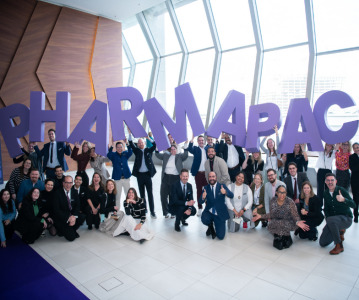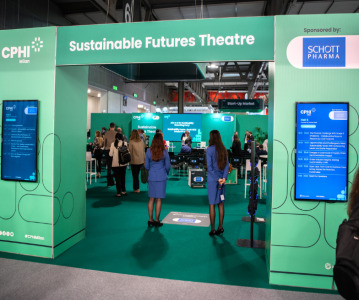Innovations in proteomics and genomics drive era of precision medicine

Broad spectrum of technological advances for cancer research on display at AACR 2016.
Thermo Fisher Scientific will highlight its extensive portfolio of innovations for research aimed at addressing the growing need for end-to-end solutions that enable more effective cancer treatments in the future. The new products and a wide spectrum of scientific posters are being featured at the American Association for Cancer Research (AACR) 2016 Annual Meeting, booth #1530 at the Ernest N. Morial Convention Center.
“As precision medicine advances, the scale and depth of Thermo Fisher’s growing cancer research portfolio is uniquely suited to serve the needs of our customers in their collective endeavor to deliver cures through cancer science,” said Joe Bernardo, president of clinical next-generation sequencing for Thermo Fisher. “Through our commitment to innovation, we will continue to enable breakthroughs in the lab intended for the development of future clinical applications.”
Among the innovations featured at AACR are
• New Invitrogen Lenti Array CRISPR Libraries significantly expand the scientific community’s ability to use CRISPR based genome editing technology to identify key therapeutic targets and understand complex biological pathways. Enabling customers to completely knockout entire panels of genes increases the quality and the efficiency of screening experiments. Understanding phenotypic responses is key for cancer research.
• Researchers looking for a single, simplified solution for the widest range of targeted sequencing applications, the new Ion S5 and Ion S5 XL next-generation sequencing (NGS) systems are rapid, cost-effective and flexible platforms that can be scaled for all research areas. Built upon the proven capabilities of Ion Torrent technology, the new Ion S5 systems combine the ability to sequence gene panels and small genomes as well as exomes, transcriptomes and custom assays. The platforms are designed with plug-and-play, cartridge-based reagents to make setting up and operating the sequencers simple and efficient.
• As part of a comprehensive proteome analysis workflow for cancer research, the next-generation Thermo Scientific Vanquish ultra-high-performance liquid chromatography (UHPLC) system combined with the Thermo Scientific Q Exactive Plus Quadrupole-Orbitrap and the Thermo Scientific TSQ Quantiva Triple Quadrapole mass spectrometers can help uncover the complexities of the proteome and enable analysis of complex biological matrices routinely used in clinical research laboratories. This multidisciplinary approach to study the proteome and view cancer as a system rather than an ensemble of molecules - acquiring genome-scale information from proteomic analysis - can transform researchers’ ability to link genotype to phenotype in cancer.
• The Invitrogen Pre-Defined siRNA Libraries are new for discovery applications that leverage the proprietary Silencer (unmodified) and Silencer Select (chemically modified) siRNA technologies to better understand phenotypic responses for cancer research. These new catalogues expand the researcher’s capabilities in RNAi screening against updated genome targets and siRNA designs to effectively investigate biological pathways.
• The Applied Biosystems Minor Variant Finder Software is a new tool developed for the detection and reporting of minor mutations by Sanger sequencing. The innovative algorithm of the software neutralizes the background noise using a control sample, and enables calling of minor variants at a detection level as low as 5 percent. Depending on the cancer type, the moderate number of relevant variants in oncogenes (for example, KRAS, NRAS, etc.) and/or tumor suppressor genes (for example, TP53) could be detected quickly and cost-effectively. The software is also an important confirmatory method for NGS results.
• The Thermo Scientific NanoDrop One and NanoDrop OnceC UV-V microvolume spectrophotometers are designed to help life science researchers better understand sample quality with only 1-2 µL of sample to avoid costly delays caused by troubleshooting and/or repeat experiments. The spectrophotometers feature the new Thermo Scientific Acclaro Sample Intelligence technology, which enables scientists to identify sample contaminants, obtain corrected concentration results and receive instant feedback about sample quality with guided technical support. A wide dynamic range avoids the need to dilute samples, and the Auto-Measure feature streamlines quantitation.
Related News
-
News Women in Pharma: Career Design for Women
Our monthly Women in Pharma series highlights the influential lives and works of impactful women working across the pharmaceutical industry, and how the industry can work towards making the healthcare industry and workplace more equitable and inclusive... -
News Pfizer may shift production back to US under Trump pharma tariffs
At the 45th TD Cowen annual healthcare conference in Boston, USA, Pfizer CEO Albert Bourla outlined the potential for Pfizer to shift its overseas drug manufacturing back to the US as pharmaceutical industry players weigh their options against Presiden... -
News Women in Pharma: Connecting accessible pharma packaging to patients – a Pharmapack Special
Throughout our Women in Pharma series, we aim to highlight how CPHI events encourage discussions around diversity, equity, and inclusion initiatives in the pharmaceutical industry. -
News CPHI Podcast Series: Packaging expert perspectives at Pharmapack 2025
This month's podcast episode sounds a little different, covering the latest event in Paris – Pharmapack 2025. Digital Editor Lucy Chard speaks to several experts direct from the floor of the show, bringing you right in on the action.&nbs... -
News Closing 2024 with Editors' picks of top articles from the past year
Coming to the end of 2024 and it’s certainly been a busy year, for CPHI and for the rest of the pharmaceutical and healthcare industry. Topics of conversation throughout the last 12 months have been varied, touching on the technical, to the polit... -
News SCHOTT Pharma’s sustainable journey with CPHI
Sustainability is of paramount importance in the pharmaceutical industry. See how a recent partnership between CPHI and SCHOTT Pharma has helped to highlight and accelerate their sustainability journey to reach global goals. -
News CPHI Podcast Series: Investing in a vision for the future of life sciences
In this episode Lucy Chard is joined by Rajiv Khatau to discuss the importance of looking into new therapeutic areas and some of the more niche areas of pharmaceuticals, and investing in the future of the industry. -
News Lessons from CPHI Milan 2024: Sunny Intervals for Pharma Manufacturing?
As the 2024 CPHI conference wrapped up in Milan, we caught up with L.E.K. Consulting – a global strategy consulting firm with deep expertise in pharma manufacturing – to discuss evolving market perspectives and business outlook.
Position your company at the heart of the global Pharma industry with a CPHI Online membership
-
Your products and solutions visible to thousands of visitors within the largest Pharma marketplace
-
Generate high-quality, engaged leads for your business, all year round
-
Promote your business as the industry’s thought-leader by hosting your reports, brochures and videos within your profile
-
Your company’s profile boosted at all participating CPHI events
-
An easy-to-use platform with a detailed dashboard showing your leads and performance







